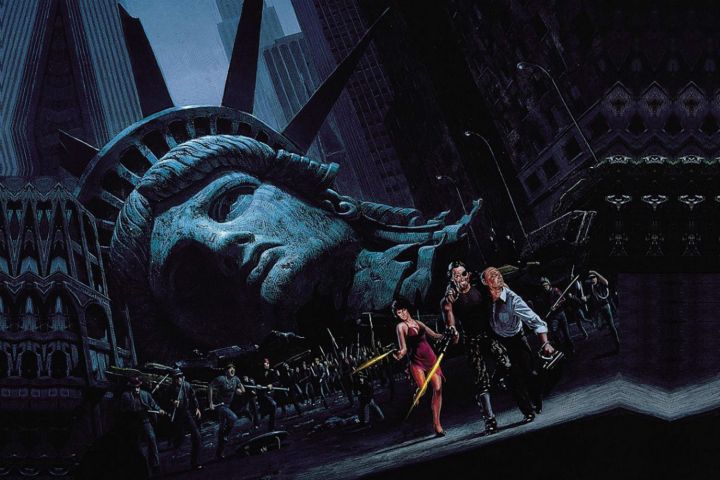
When it comes to guesses about either technological advances, political changes in society, or — heck — sci-fi writers’ sustained belief that the U.S. government is one financial meltdown away from organizing Hunger Games-style events, not all predictions can be winners. Here are eight sci-fi movies and TV shows that nailed their premises to a particular year, and (often thankfully) got it wrong.
Soylent Green (1973)
Soylent Green is a great 1970s movie starring Charlton Heston. It’s a brilliant blend of pessimistic sci-fi, police procedural, and post-Watergate conspiracy theory. (Spoiler: Soylent Green, the green wafer made of “high-energy plankton,” turns out to be recycled people.)
As great a movie as it is, though, its 1999 setting ended up not having too much in common with the real year. In the actual 1999, the closest thing we had to a living sci-fi dystopia were fears about the Y2K bug and the nu metal musical genre as a whole. Come to think of it, Limp Bizkit wouldn’t be a bad name for a reconstituted human-based wafer!
2001: A Space Odyssey (1968)
We covered Stanley Kubrick’s masterpiece as an example of sci-fi that predicted tech correctly, so what’s it doing on this list? Well, for one thing, its HAL 9000 technology, while certainly prescient, was well beyond the closest thing we had to an AI assistant in 2001: Microsoft’s “Clippy” paperclip assistant.
Our biggest gripe, though, is the lack of a moonbase — something that was also promised for approximately the same time by Gerry Anderson’s Space: 1999 series. Here in 2017, a base on the moon is still talked about, but any plans to build one seem to have gone on the back burner.
Lost In Space (1965-1968)
Not content to just predict a moonbase for the turn of the century, popular sci-fi TV series Lost in Space promised us a mission to Alpha Centauri, with hopes of colonizing it. The far-flung year this was set for? It was 1997, of course. Needless to say, it didn’t happen.
To be fair, it didn’t happen in Lost in Space, either — hence the show’s title.
Demolition Man (1993)
Cult 1990s action movie Demolition Man thought that, by the end of 2010, the United States would be a very different place. The good news? On September 25, the last MDK (that’s “Murder Death Kill”) until 2032 takes place in one of America’s biggest cities. The bad news? That a massively destructive earthquake hit the U.S., necessitating the combining of Los Angeles and San Diego into one megacity.
Neither of these things came to pass.
Terminator franchise (1984-?)
According to Terminator 2: Judgment Day, on August 4, 1997, the Skynet AI becomes self-aware at 2:14 a.m. Eastern Time and immediately starts firing off nuclear missiles like they’re going out of style. Fortunately, that didn’t happen.
The disappointing 2003 follow-up, Terminator 3: Rise of the Machines, reveals that Judgment Day was postponed until 2004. Luckily, we dodged that one as well. Unfortunately, humanity was rewarded with two more terrible movies in this once-great franchise.
Escape from New York (1981)
Geez, what do people have against 1997? After Lost in Space, but before Terminator, director John Carpenter singled it out as the year for his dystopian take on a future America. It’s set in a crime-ridden United States in which New York’s Manhattan Island has been turned into a maximum security prison.
In real life? Contrary to the grim and gritty cityscapes of 1980s sci-fi movies, by the late 1990s and beyond, places like New York had been revitalized. Far from urban hellholes, today’s cities are cleaner, safer, and more appealing than ever.
Death Race 2000 (1975)
Filmmakers of the 1970s sure didn’t think the millennium was going to be a fun time for too many folks. Death Race 2000 predicted that a massive financial crash in 1979 would bring economic ruin to the entire planet.
The U.S. government decided that the best course of action would be a two-pronged effort: Declaring martial law across the country, and organizing a massively violent Transcontinental Road Race, where drivers kill as many innocent bystanders as possible en route to the finish line. The car race thing didn’t happen. The financial crash was pretty prescient, though.
The Running Man (1987)
A lot like Death Race 2000, only with a considerably higher budget, The Running Man takes place in a futuristic dystopia that follows a worldwide economic collapse. The big difference is that instead of a giant car race, the population enjoys watching a game show in which convicted criminals fight for their lives.
The year it’s predicted for? 2017. That means we’ve still got four months to make it through in order to prove this one wrong. We’re doing well so far, even if lines like, “The truth hasn’t been very popular lately” give us plenty of pause for thought!


